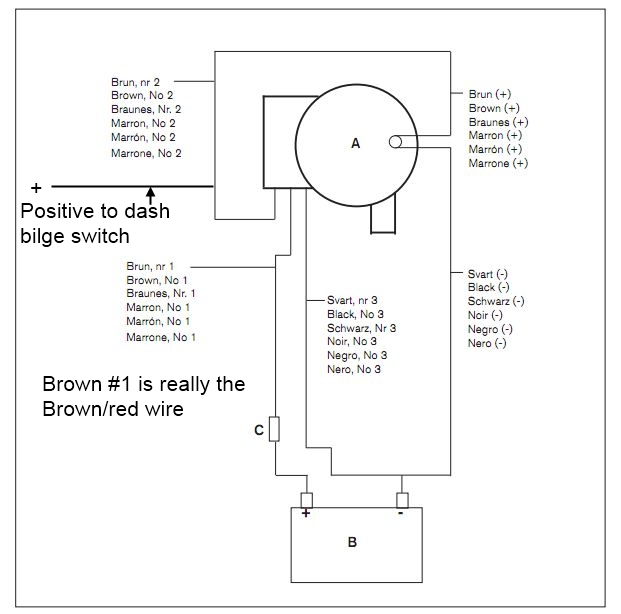Keep Your Boat Afloat: The Ultimate Guide to Automatic Bilge Pumps
Ever imagined yourself enjoying a peaceful day on the water, only to be interrupted by the unsettling slosh of water accumulating in your boat's bilge? A sinking feeling, literally. This nightmare scenario is precisely why a reliable bilge pump system, particularly an automatic one, is an absolute must-have for any boat owner. Don't wait for disaster to strike; understanding the ins and outs of these essential devices can save you a whole lot of trouble, and potentially your boat.
An automatic bilge pump is a critical piece of safety equipment that automatically removes unwanted water from the lowest compartment of your boat, known as the bilge. Unlike manual bilge pumps, which require you to physically operate them, these automated marvels work tirelessly in the background, keeping your vessel afloat and safe. They act as a silent guardian, protecting your investment and peace of mind.
From small fishing boats to large yachts, virtually every type of watercraft benefits from an automatic bilge pumping system. Rainwater, waves splashing over the bow, or even a small leak can lead to a dangerous buildup of water. An automatic bilge pump system provides a constant defense against these threats, ensuring your vessel remains buoyant and safe.
Early bilge pumps were simple manual devices, often requiring strenuous effort to operate. The advent of electricity revolutionized bilge pump technology, paving the way for the automated systems we rely on today. These electric bilge pumps, coupled with a float switch, provided a hands-free solution to bilge water removal. This evolution has significantly enhanced boating safety and convenience, allowing boaters to focus on enjoying their time on the water rather than constantly monitoring the bilge.
Choosing the right automatic bilge pump involves considering factors such as your boat's size, the typical conditions you encounter, and the potential sources of water ingress. Selecting a pump with adequate capacity is crucial, as a small pump may not be able to keep up with a large leak or heavy rainfall. Understanding the different types of pumps available, such as submersible and centrifugal pumps, also plays a vital role in making an informed decision. Proper installation and regular maintenance are essential for ensuring your automatic bilge pump functions effectively when you need it most.
A key component of the automatic bilge pump is the float switch. This device acts as the brains of the operation, automatically activating the pump when the water level in the bilge reaches a certain point. Understanding how the float switch works and how to ensure its proper functioning is essential for reliable automatic bilge water removal. Malfunctioning float switches can lead to the pump running continuously, draining the battery, or failing to activate when needed.
Three key benefits of having an automated bilge pump system include peace of mind, enhanced safety, and protection of your investment. Knowing that your boat is constantly protected from accumulating bilge water allows you to relax and enjoy your time on the water. The enhanced safety provided by an automatic system is invaluable, especially in situations where a rapid buildup of water could overwhelm a manual pump. Finally, protecting your boat from the damaging effects of bilge water safeguards your investment, preventing costly repairs and extending the life of your vessel.
Advantages and Disadvantages of Automatic Bilge Pumps
| Advantages | Disadvantages |
|---|---|
| Automatic operation - no manual pumping required | Reliance on battery power |
| Enhanced safety - prevents sinking due to bilge water | Potential for float switch malfunction |
| Protects boat from water damage | Can be noisy |
Five best practices for automatic bilge pump systems include: regular inspection and cleaning of the pump and float switch, testing the system regularly, ensuring proper wiring and connections, choosing the correct pump size for your boat, and having a backup manual bilge pump onboard.
Common challenges include clogged intakes, faulty float switches, and wiring issues. Solutions involve regular cleaning, float switch replacement, and professional electrical inspection.
FAQs: What is an automatic bilge pump? How does it work? How do I choose the right size? How do I install it? How do I maintain it? What are common problems? How do I troubleshoot it? Why is it important?
Tips and tricks: Check your bilge pump regularly. Clean the float switch. Ensure proper wiring. Have a backup plan.
In conclusion, an automatic bilge pump is an indispensable piece of equipment for any boat owner. It offers peace of mind, enhances safety, and protects your investment. While manual bilge pumps have their place, the convenience and reliability of an automatic system are undeniable. By understanding the workings of an automatic bilge pump, performing regular maintenance, and addressing potential issues proactively, you can ensure your boat remains safe and afloat for years to come. Don’t compromise on safety – equip your boat with a reliable automatic bilge pump and enjoy the water with confidence. Invest in a quality automatic bilge pump system today. Your boat, and your peace of mind, will thank you.
Deciphering the alien emoji a guide to its urban meaning
Hack your harvest dominate your nz garden with this planting calendar
Five nights at freddys reacts to william afton a deep dive















